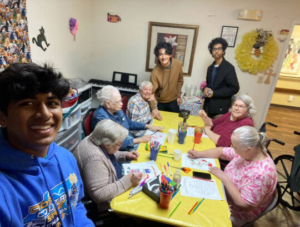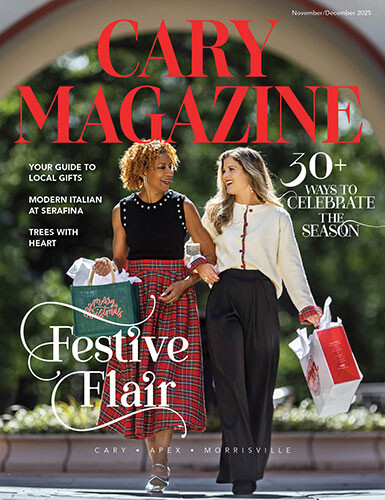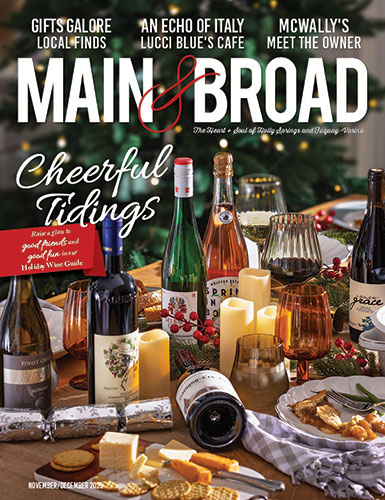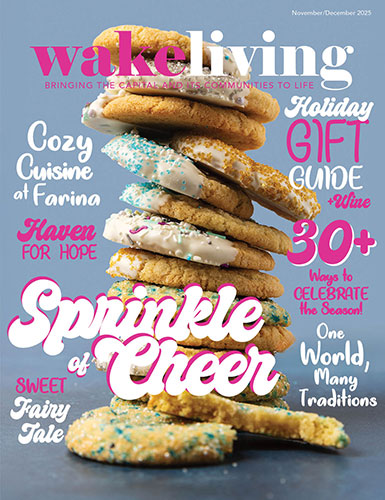Arjun Bhonsle, the student founder and president of Minds Matter Initiative, the local teen chapter of the Alzheimer’s Foundation of America, often mentions a senior care home resident who, during MMI’s first volunteering event spent making origami doves, shared how much the small session meant to the residents who otherwise didn’t get to enjoy much activity.
“Seeing a senior smile because of something so simple — a shared laugh, a kind word, or a creative project — is exactly why we continue to grow the chapter,” he explains.
Along with Bhonsle, Kevin Gencel, vice president of membership; Josh Asada, vice president of programming; Meryem Sena Golbasi, public relations officer; Sina Dehghani, director of logistics; and Vijaya Varadarajan, editor-in-chief, are harnessing their generational initiative to raise awareness about Alzheimer’s disease.
Read on to learn more about Minds Matter Initiative.
What is MMI’s mission?
The mission is simple yet powerful: to raise awareness about Alzheimer’s and mental health, foster intergenerational connections, and provide tangible support to those affected.
Why is this cause important to you?
My grandfather was always a role model, someone whose age didn’t determine his physical limitations. His warmth and ability to make joy out of the simplest moments affected everyone around him. But, over the years, something started to change. Alzheimer’s quietly entered his life, and I watched my grandfather slowly fade.
In seventh grade, when I traveled to India, I observed he’d misplace his glasses or forget his sandals and stroll outside barefoot. When I visited again, everything changed: I sat beside him, excited to finally talk to him in person, and he just looked at me with a blank stare. Watching him lose his identity — and seeing my parents struggle to care for him without adequate resources — was heartbreaking. As a teenager, I felt powerless. I wanted to do something, anything, to make the situation better, not just for my grandfather but for the countless families who were undoubtedly going through the same thing.
The idea of starting MMI wasn’t an instant realization — it was more like a seed planted by those painful experiences, which grew over time into a genuine desire to make a difference.
How does MMI raise awareness for Alzheimer’s?
The largest part of our organization involves working with event directors of assisted living facilities to organize volunteering sessions where our high school members visit to provide events, including board games, painting, bingo, trivia, or other activities that work with the facilities’ resources. Additionally, we spread awareness by engaging high schoolers in the experience of working with seniors, exposing them to the effects of Alzheimer’s and the gratification of giving back to a part of our community that otherwise doesn’t get much attention from younger generations. Also, through our social media endeavors, including Instagram, TikTok, and our blog posts, we’ve reached thousands of people with our cause and the importance of recognizing, understanding, and giving back to the senior population.

Thanks to the research advancements of the last 30 years, MMI believes that this generation has more potential to make an impact towards Alzheimer’s patients than any other before it.
Please tell us more about your summer camp.
One of the standout programs that helped propel our impact was the MMI Summer Camp. Designed for third to seventh graders, this camp introduced high school–level neuroscience and psychology concepts in an engaging and accessible way. Partnering with Dr. Hoffman from UNC-Chapel Hill, we developed an engaging curriculum (one that included a lamb brain dissection) that sparked curiosity and encouraged students to think critically about the brain and mental health. We advertised through our school, and the camp raised $3,600.
What do ambassadors do?
One of MMI’s greatest achievements is building a network of over 100 members across 10 states through a decentralized approach. We recruit ambassadors who establish local branches of MMI in their schools or communities. From North Carolina to California, each branch brings unique creativity and passion and helps us expand our national impact and inspire others to join the cause.
Do you face challenges as a student-led organization? Are there any advisors involved?
Being a student-led organization has given us as many opportunities as it has struggles. For positives, there aren’t many organizations doing similar programs. Additionally, many high schoolers are interested in joining organizations like ours to develop their career skills or get volunteer hours for graduation. By contrast, we’ve had to work hard to generate credibility and interest among assisted living facilities.
We have greatly benefited from the guidance of Adam Cruz, the national membership coordinator at the Alzheimer’s Foundation of America. His support has been instrumental to our growth, reach, and impact; he has provided invaluable advice and resources and has been one of MMI’s biggest fans. Go, Mr. Cruz!

When the volunteers of Minds Matter Initiative visit senior care homes, they do more than planned activities — they form genuine bonds.
How can the community support you?
One of the best ways is through word of mouth. The more the public can discuss and become educated on Alzheimer’s, the easier it is to convince organizations to allocate funding and resources toward research efforts.
Another way is by joining our cause. If you are a student who shares our values and is excited about our work, please feel free to reach out.
How do you ensure your work continues?
We want our impact to not only be extensive but also long-lasting. As a result, we are constantly looking to expand our leadership and ambassador team, especially with those younger than us, to give them a head start with the potential growth they can offer MMI. Also, our neuroscience summer camp for elementary and middle school students explores many of Alzheimer’s key concepts and the ways they can contribute to local initiatives dedicated to the cause.
Any advice for teenagers looking to make a positive community impact?
Find a couple of friends, find something you are jointly passionate about, and just execute. Dream bigger while scaling bigger.
Any events coming up?
We have a $2,000 fundraiser planned early this year for Phoenix Assisted Living, in the summer we will have another neuroscience summer camp, and we are continuing our weekly volunteering efforts at senior care facilities.
Would you like to share anything else?
The blog section is a central platform for sharing knowledge, raising awareness, and sparking conversations about Alzheimer’s disease and brain health. Our blogs cover a wide range of topics, including the latest research breakthroughs, tips for maintaining cognitive health, personal stories from individuals impacted by Alzheimer’s, and updates on our ongoing projects and events. By consistently publishing well-researched, thought-provoking content, the blog inspires action and fosters a deeper understanding of the disease while amplifying the voices of those dedicated to making a difference.
- New Year, New Adventures
- Garden Adventurer: Seeing Red
- Liquid Assets: It Girl
- Liquid Assets: Crimson Orchard Fizz
- Restaurant Profile: Fratelli’s Delicatessen
- Baking New Ground
- Nonprofit Spotlight: Minds Matter Initiative
- Top Dog
- On Trend: Assisted Stretching
- Small Business Spotlight: The Curative Wellness Boutique
- The Man Behind the Mic
- Erica Chats: You: The Biggest Project You’ll Ever Work On!
- Things to Do: January/February 2025






